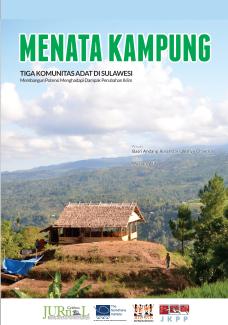Empowerment for Climate Change Mitigation: Experiences of Three Indigenous Communities in Sulawesi
Posting Date
Menata Kampung, Tiga Komunitas Adat di Sulawesi Membangun Potensi Menghadapi Dampak Perubahan Iklim (Organizing Villages, Three Indigenous Communities in Sulawesi Building Their Potential to Face Climate Change Impacts) was published by JURnal Celebes (Environmental Advocacy Journalists Association) in Makassar. This book was authored by Basri Andang, Ika Lestari, and Wahyu Chandra, with editor Mustam Arif. This book serves as recorded documentation of efforts towards the empowerment of indigenous peoples in Sulawesi to tackle climate change. This work is a collaboration between several civil society organizations is supported by the Samdhana Institute and coordinated by the Indigenous Peoples' Alliance of the Archipelago (AMAN) and the Participatory Mapping Working Network (JKPP).
Indigenous communities many of whom continue to depend on forests and natural resources are particularly threatened by climate change. Local wisdom, developed over centuries of acclimating to specific contexts, is often rendered powerless to tackle the scale and frequency of natural disasters brought about by climate change.
The book documents work to provide a foundation for community empowerment towards more effective ways to combat and adapt to climate change through supporting three key actions. First, communities should be supported to strengthen management of their areas. Second, regulatory support should support community management of natural resources and the landscapes which house them. Third, both of these components must be supported by open access to information and effective knowledge management. The latter is key to enhance government transparency and accountability, as well as promote an informed, engaged, and responsible citizenry.
Participating organisations took part in a workshop on August 13-14, 2010 in Palu, Central Sulawesi. Organisations designated an Area Management Group (Simpul Wilayah Kelola) coordinated by AMAN Central Sulawesi Chapter, a Policy Group coordinated by AMAN North Sulawesi Chapter, and a Campaign and Public Awareness Group coordinated by JURnal Celebes. Later on, the Policy Group responsibilities were transfered from AMAN North Sulawesi Chapter to AMAN South Sulawesi Chapter given .
This three-year program ended at the end of 2013 and brought forward initiatives for indigenous village reconstructions based on indigenous village master plans. The indigenous master plans were developed through participatory processes, and aim to serve both as a demonstration of, and a practical tool for, integrating traditional wisdom to strengthen existing administrative plans in a manner that is wholly owned and benefits from the experiences of indigenous communities.
Three indigenous communities featured in the book, include the Bada' indigenous people in Poso District, Central Sulawesi; Pattalassang Community in Gowa District, South Sulawesi; and Dongi Community in East Luwu District, South Sulawesi. The experiences from Uraso Village in Mappadeceng Sub-district, North Lusu District, South Sulawesi implemented by the Wallacea Association is included.
As Indonesia continues forward on its path to realize REDD+, it remains unclear whether REDD will prove sufficient for mitigating climate impacts. However, the momentum of REDD has and should continue to be utilized to empower indigenous peoples as key allies for conservation and human rights realization.
To obtain a copy of this book, please contact:
JURnal Celebes
Jl. Damar No. 48
Panakkukang, Makasar 90233
South Sulawesi, Indonesia
Email: jurnalcelebes@gmail.com
Indigenous communities many of whom continue to depend on forests and natural resources are particularly threatened by climate change. Local wisdom, developed over centuries of acclimating to specific contexts, is often rendered powerless to tackle the scale and frequency of natural disasters brought about by climate change.
The book documents work to provide a foundation for community empowerment towards more effective ways to combat and adapt to climate change through supporting three key actions. First, communities should be supported to strengthen management of their areas. Second, regulatory support should support community management of natural resources and the landscapes which house them. Third, both of these components must be supported by open access to information and effective knowledge management. The latter is key to enhance government transparency and accountability, as well as promote an informed, engaged, and responsible citizenry.
Participating organisations took part in a workshop on August 13-14, 2010 in Palu, Central Sulawesi. Organisations designated an Area Management Group (Simpul Wilayah Kelola) coordinated by AMAN Central Sulawesi Chapter, a Policy Group coordinated by AMAN North Sulawesi Chapter, and a Campaign and Public Awareness Group coordinated by JURnal Celebes. Later on, the Policy Group responsibilities were transfered from AMAN North Sulawesi Chapter to AMAN South Sulawesi Chapter given .
This three-year program ended at the end of 2013 and brought forward initiatives for indigenous village reconstructions based on indigenous village master plans. The indigenous master plans were developed through participatory processes, and aim to serve both as a demonstration of, and a practical tool for, integrating traditional wisdom to strengthen existing administrative plans in a manner that is wholly owned and benefits from the experiences of indigenous communities.
Three indigenous communities featured in the book, include the Bada' indigenous people in Poso District, Central Sulawesi; Pattalassang Community in Gowa District, South Sulawesi; and Dongi Community in East Luwu District, South Sulawesi. The experiences from Uraso Village in Mappadeceng Sub-district, North Lusu District, South Sulawesi implemented by the Wallacea Association is included.
As Indonesia continues forward on its path to realize REDD+, it remains unclear whether REDD will prove sufficient for mitigating climate impacts. However, the momentum of REDD has and should continue to be utilized to empower indigenous peoples as key allies for conservation and human rights realization.
To obtain a copy of this book, please contact:
JURnal Celebes
Jl. Damar No. 48
Panakkukang, Makasar 90233
South Sulawesi, Indonesia
Email: jurnalcelebes@gmail.com




